英语省略与倒装
英语倒装和省略
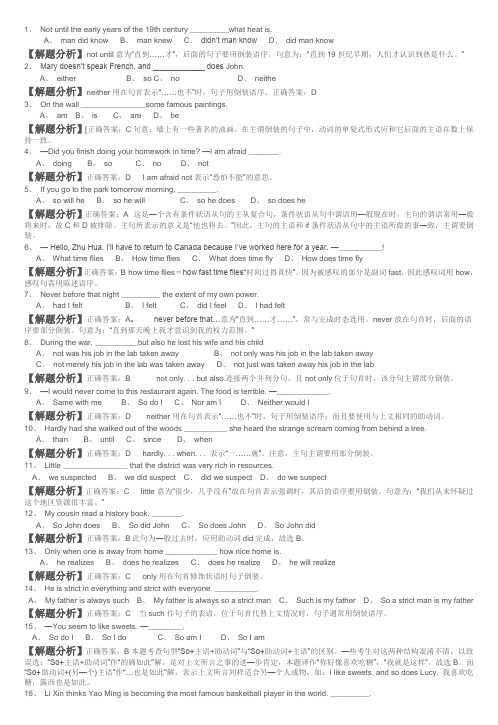
1、Not until the early years of the 19th century _________what heat is.A、man did knowB、man knewC、didn’t man knowD、did man know【解题分析】not until意为“直到……才”,后面的句子要用倒装语序。
句意为:“直到19世纪早期,人们才认识到热是什么。
”2、Mary doesn’t speak French, and ____________ does John.A、eitherB、soC、noD、neithe【解题分析】neither用在句首表示“……也不”时,句子用倒装语序。
正确答案:D3、On the wall _______________some famous paintings.A、amB、isC、areD、be【解题分析】[正确答案:C句意:墙上有一些著名的油画。
在主谓倒装的句子中,动词的单复式形式应和它后面的主语在数上保持一致。
4、—Did you finish doing your homework in time? —I am afraid _______.A、doingB、soC、noD、not【解题分析】正确答案:D I am afraid not表示“恐怕不能”的意思。
5、If you go to the park tomorrow morning, _________.A、so will heB、so he willC、so he doesD、so does he【解题分析】正确答案:A这是—个含有条件状语从句的主从复合句,条件状语从句中谓语用—般现在时,主句的谓语常用—般将来时,故C和D被排除。
主句所表示的意义是“他也将去。
”因此,主句的主语和if条件状语从句中的主语所做的事—致,主谓要倒装。
6、—Hello, Zhu Hua. I’ll have to return to Canada because I’ve worked here for a year. —__________!A、What time fliesB、How time fliesC、What does time flyD、How does time fly【解题分析】正确答案:B how time flies=how fast time flies“时间过得真快”。
英语语法中的倒装句和省略句结构
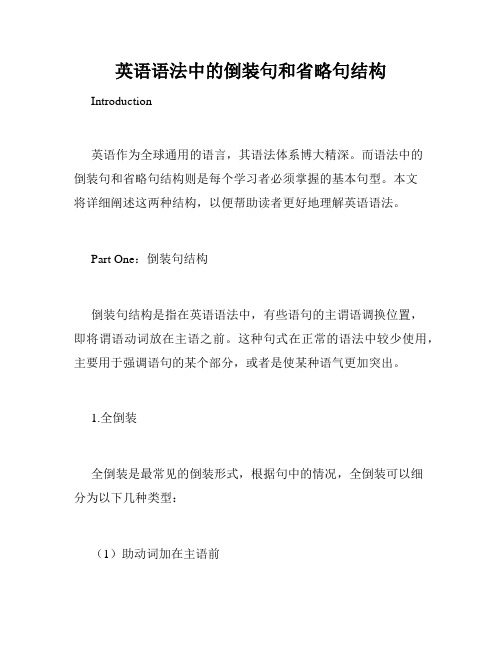
英语语法中的倒装句和省略句结构Introduction英语作为全球通用的语言,其语法体系博大精深。
而语法中的倒装句和省略句结构则是每个学习者必须掌握的基本句型。
本文将详细阐述这两种结构,以便帮助读者更好地理解英语语法。
Part One:倒装句结构倒装句结构是指在英语语法中,有些语句的主谓语调换位置,即将谓语动词放在主语之前。
这种句式在正常的语法中较少使用,主要用于强调语句的某个部分,或者是使某种语气更加突出。
1.全倒装全倒装是最常见的倒装形式,根据句中的情况,全倒装可以细分为以下几种类型:(1)助动词加在主语前例如:Are you sure about that?(你对此确信吗?)(2)谓语动词前有否定词例如:Never have I been so happy in my life.(我一生中从未如此开心。
)(3)表示地点、时间或者原因的短语放在句首时例如:In the middle of the room stood a table.(屋子中央放着一张桌子。
)(4)以only开头的句子例如:Only when he arrived did I realize how much I missed him.(他到了才让我意识到我有多想念他。
)2.部分倒装在一些情况下,只有句中的某些成分需要进行倒装,这种形式就叫部分倒装。
部分倒装的几种常见形式如下:(1)否定短语位于句首例如:Not only does he speak English, but he also speaks fluent French.(他不仅能说英语,而且还能说流利的法语。
)(2)so、such和as引导的状语位于句首例如:Such was the beauty of the garden that I couldn't help but take a picture.(花园的美丽如此迷人,我不得不拍下照片。
)Part Two:省略句结构省略句结构是指在英语语法中,有些句子的主语、谓语或者其他成分可以省略,使句子更简单明了。
高三英语倒装与省略试题答案及解析

高三英语倒装与省略试题答案及解析1. At no time ________the rules of the game. It was unfair to punish them.A.they actually broke B.do they actually breakC.did they actually break D.they had actually broken【答案】C【解析】试题分析: 句意:他们绝不会违反比赛的规定。
惩罚他们是不公平的。
At no time “绝不”,在英语中含有否定词的短语位于句首时句子用部分倒装语序,比如in no case等。
根据后句中的was可知应该用一般过去时态,选C。
【考点】考查倒装句2. For a moment nothing happened, and then ______ all shouting together.A.voices had come B.came voicesC.voices would come D.did voices come【答案】B【解析】考查倒装句。
句意:有一会儿什么都没有发生,然后传来了众人齐喊的声音。
以 then引起的句子中,谓语动词常为 be, come, go 等,句子要用完全倒装,故选B项。
3. Jane won't join us for dinner tonight and________.A.neither won't Tom B.Tom won't eitherC.Tom will too D.so will Tom【答案】B【解析】B[考查特殊句式。
句意:简不会来与我们共进晚餐,汤姆也不会来。
此处是否定句,故使用either,而too一般用于肯定句中。
此处也可以用so倒装的否定式,即neither/nor will Tom。
注意A项中neither表否定意义,所以不能用won't。
高考英语语法专题复习-倒装句和省略句
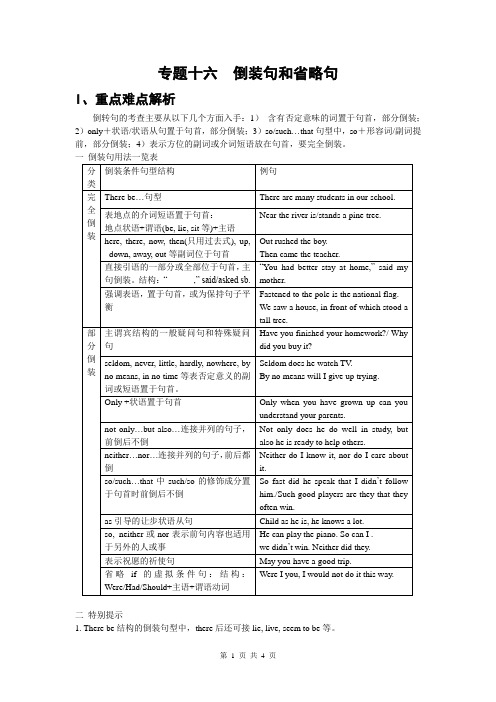
专题十六倒装句和省略句I、重点难点解析倒转句的考查主要从以下几个方面入手:1)含有否定意味的词置于句首,部分倒装;2)only+状语/状语从句置于句首,部分倒装;3)so/such…that句型中,so+形容词/副词提前,部分倒装;4)表示方位的副词或介词短语放在句首,要完全倒装。
二特别提示1. There be结构的倒装句型中,there后还可接lie, live, seem to be等。
例如:There lived an old man in the village long long ago.2. here, there, now, then(只用过去式), up, down, away, out等副词位于句首,主语为代词时不倒装。
例如:Out he rushed.3. 直接引语的一部分或全部位于句首,主句倒装。
但是主语为代词时不倒装。
“You had better stay at home,” she said.4. So位于句首不倒装的情况:主语与前句相同,表赞同, 译为“确实如此”。
例句:---Mike studies hard.---So he does. (确实是。
) 比较: (---So do I .我也是。
)5. 表示前句内容也适用于另外的人或事,前句如果列举了两种事实以上,用“So it is/waswith sb/sth.”回答。
---Tom is kind and often helps those in trouble.---So it is with his father.省略句高考命题导向:省略是一种避免重复,保持简洁的语法手段。
缺少一个或一个以上的必要语言成分,但在一定语境中能够独立存在,意义明确,并且能发挥交际功能的句子叫做省略句。
高考主要是考查省略在固定结构中的运用。
省略句用法一览表II、实战演练根据括号中的提示完成句子。
1.Not until __________________ (I; shout) at the top of my voice ________________ (he; turn) his head.2.I won the prize at last. Never in my life ___________________ (I; feel) so happy.3.Hardly _____________________ (the thief; see) the police ___________ he ran away.4.---Hurry up! There _______________________ ( the bell; go).---My goodness! Has Mrs Li come yet?---Look! Here ___________________ (he; come)5.Not only ___________________ (he; like) singing, but __________________ (he; have)a good voice.6.---David has passed the final exam smoothly.---So _________________ (he; have), and ___________________ (I, have).7.So ____________________ (he; be frightened) in the darkness that he did not dare to move an inch.8.Up _________________________ (the balloon; go) into the air.9.At the foot of the mountain _________________________ (a village; lie)10.I’v tried very hard to improve my English. But by no means _______________________ (the teacher, be satisfied) with my progress.11.If Joe’s wife doesn’t go to the party, neither ______________________.(他也不去)12.Should _________________________ (如果明天下雨), we would have to put off the sports meet.13.Child __________________ (尽管只是孩子), he shows great consideration towards the others.14.---Mike hadn’t passed the exam and was afraid of being scolded.--- ________________________. (我也一样)15.________________________________ (我们一听到铃声) than we rushed into the classroom.16.---He hasn’t finished the work yet.---Well, he _________________.(本该完成)17.The man we followed suddenly stopped and looked as if _______________ (see) whether he was going in the right direction.18.---Is your mother a teacher?---No, but she __________________.(过去是)19.---Do you know Anna’s telephone number?--- _______________ .(恐怕不知) As a matter of fact, I don’t know any Anna, either.20.---Who should be responsible for the accident?---The boss, not the workers. They just carried out the order ____________ (按被告诉的).答案:1. I shouted; did he turn 2. have I felt 3. had the thief seen; when 4. goes the bell; he comes 5. does he; he has 6. he has; so have I 7. frightened was he8.went the balloon 9. lies a village 10. is the teacher satisfied 11. will he 12. it rain tomorrow 13. as/though he is 14. So it was with me. 15. No sooner had we heard the ring 16. should/ought to have 17. to see 18. used to be 19. I’m afraid not 20. as told。
高三英语倒装与省略试题
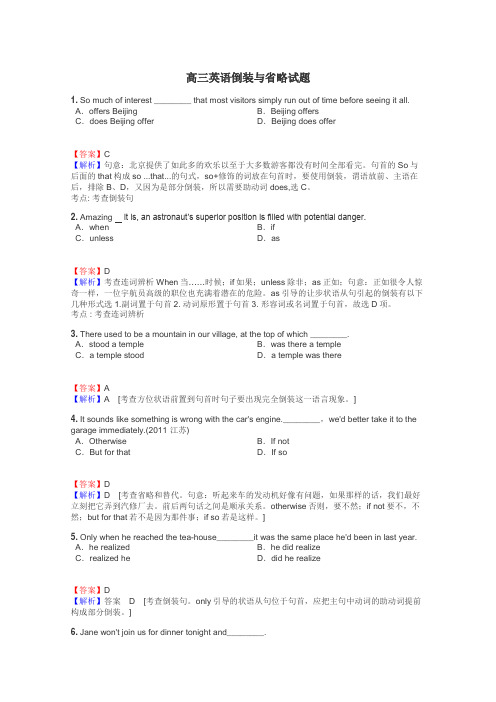
高三英语倒装与省略试题1. So much of interest ________ that most visitors simply run out of time before seeing it all. A.offers Beijing B.Beijing offersC.does Beijing offer D.Beijing does offer【答案】C【解析】句意:北京提供了如此多的欢乐以至于大多数游客都没有时间全部看完。
句首的So与后面的that构成so ...that...的句式,so+修饰的词放在句首时,要使用倒装,谓语放前、主语在后,排除B、D,又因为是部分倒装,所以需要助动词does,选C。
考点: 考查倒装句2. Amazing it is, an astronaut’s superior position is filled with potential danger.A.when B.ifC.unless D.as【答案】D【解析】考查连词辨析 When当……时候;if如果;unless除非;as正如;句意:正如很令人惊奇一样,一位宇航员高级的职位也充满着潜在的危险。
as引导的让步状语从句引起的倒装有以下几种形式选1.副词置于句首2. 动词原形置于句首3. 形容词或名词置于句首,故选D项。
考点 : 考查连词辨析3. There used to be a mountain in our village, at the top of which ________.A.stood a temple B.was there a templeC.a temple stood D.a temple was there【答案】A【解析】A[考查方位状语前置到句首时句子要出现完全倒装这一语言现象。
]4. It sounds like something is wrong with the car's engine.________,we'd better take it to the garage immediately.(2011·江苏)A.Otherwise B.If notC.But for that D.If so【答案】D【解析】D[考查省略和替代。
英语倒装、强调和省略语法点
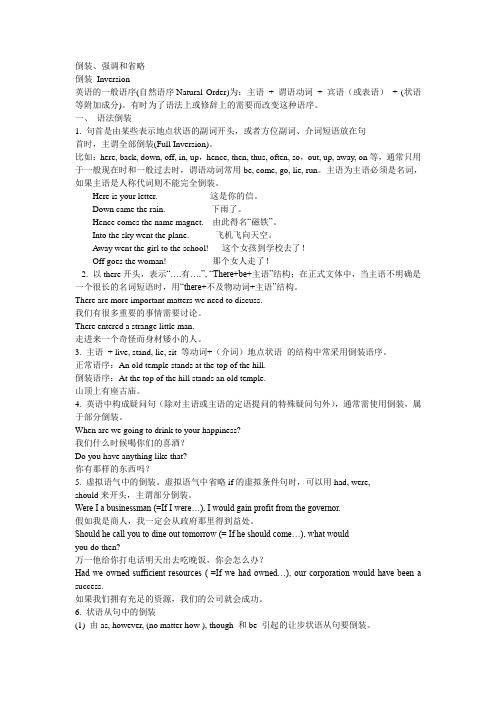
倒装、强调和省略倒装Inversion英语的一般语序(自然语序Natural Order)为:主语+ 谓语动词+ 宾语(或表语)+ (状语等附加成分)。
有时为了语法上或修辞上的需要而改变这种语序。
一、语法倒装1. 句首是由某些表示地点状语的副词开头,或者方位副词、介词短语放在句首时,主谓全部倒装(Full Inversion)。
比如:here, back, down, off, in, up,hence, then, thus, often, so,out, up, away, on等,通常只用于一般现在时和一般过去时,谓语动词常用be, come, go, lie, run。
主语为主语必须是名词,如果主语是人称代词则不能完全倒装。
Here is your letter. 这是你的信。
Down came the rain. 下雨了。
Hence comes the name magnet. 由此得名“磁铁”。
Into the sky went the plane. 飞机飞向天空。
Away went the girl to the school! 这个女孩到学校去了!Off goes the woman! 那个女人走了!2. 以there开头,表示“….有….”, “There+be+主语”结构;在正式文体中,当主语不明确是一个很长的名词短语时,用“there+不及物动词+主语”结构。
There are more important matters we need to discuss.我们有很多重要的事情需要讨论。
There entered a strange little man.走进来一个奇怪而身材矮小的人。
3. 主语+ live, stand, lie, sit 等动词+(介词)地点状语的结构中常采用倒装语序。
正常语序:An old temple stands at the top of the hill.倒装语序:At the top of the hill stands an old temple.山顶上有座古庙。
倒装句与省略句的区别及用法解析

倒装句与省略句的区别及用法解析倒装句和省略句是英语语法中常见的两种特殊句式。
它们的运用可以增加句子的多样性,使语言更加丰富,并帮助我们有效地表达思想。
本文将分析倒装句与省略句的区别,并介绍它们的用法。
一、倒装句倒装句是指在句子中调整主语和谓语的位置,通常有两种情况:完全倒装和部分倒装。
1. 完全倒装完全倒装句的结构为:助动词/情态动词/系动词 + 主语 + 谓语。
常见的倒装情况包括以下几种类型:1.1 肯定形式的完全倒装例如:- "Not only did he finish the project ahead of schedule, but he also exceeded our expectations." (他不仅提前完成了项目,而且超出了我们的预期。
)- "Rarely have I seen such a beautiful sunset." (我很少见到如此美丽的日落。
)1.2 否定形式的完全倒装例如:- "Never have I seen such a funny movie." (我从未见过这么有趣的电影。
)- "Little did they know what awaited them."(他们并不清楚等待他们的是什么。
)1.3 倒装的条件句例如:- "Had I known about the event, I would have attended." (要是我早知道这个事件,我就去参加了。
)2. 部分倒装部分倒装句是指将助动词/情态动词/系动词置于主语前,而谓语动词保持不变。
常见的部分倒装情况有以下几种类型:2.1 含有"only, hardly, rarely, seldom"等副词修饰状语从句的部分倒装例如:- "Only in this way can we achieve success." (只有通过这种方式,我们才能取得成功。
句子的倒装与省略

句子的倒装与省略句子的倒装与省略是英语语法中的重要部分,它们在句子结构和表达方式上带来了独特的变化。
本文将从倒装句和省略句两个方面进行探讨,并介绍它们的用法和注意事项。
一、倒装句倒装句是指将正常语序的主语和谓语动词颠倒位置,形成不同于正常语序的句子。
常见的倒装结构有两种情况:完全倒装和部分倒装。
1. 完全倒装完全倒装是将谓语动词放在主语之前,用于以下情况:a) 在以副词或短语开头的句子中,如"Never have I seen such a beautiful sunset."(我从未见过如此美丽的日落。
)b) 在以地点状语或时间状语开头的句子中,如"Down the street camea group of children."(一群孩子沿着街道走来。
)2. 部分倒装部分倒装是将助动词或情态动词与主语的位置互换,用于以下情况:a) 在含有否定副词或词组的句子中,如"Never have I been so disappointed."(我从未如此失望。
)b) 在以only、hardly、not until等副词开头的句子中,如"Only by working hard can you achieve success."(只有通过努力工作,你才能获得成功。
)二、省略句省略句是指在表达中省略掉某些成分,但仍能保持句子的完整和意义的语法结构。
常见的省略句有以下情况:1. 主语省略当主语在句子中已经明确或可通过上下文推断时,可以省略主语。
如"I like coffee, and (I) also enjoy tea."(我喜欢咖啡,而且我也喜欢茶。
)2. 谓语动词省略当句子已经有了一个谓语动词,而后面的句子也需要表达相同的动作时,可以省略后面的谓语动词。
如"I can swim, but he can't (swim)."(我会游泳,但他不会。
过去完成时的省略句与倒装句练习
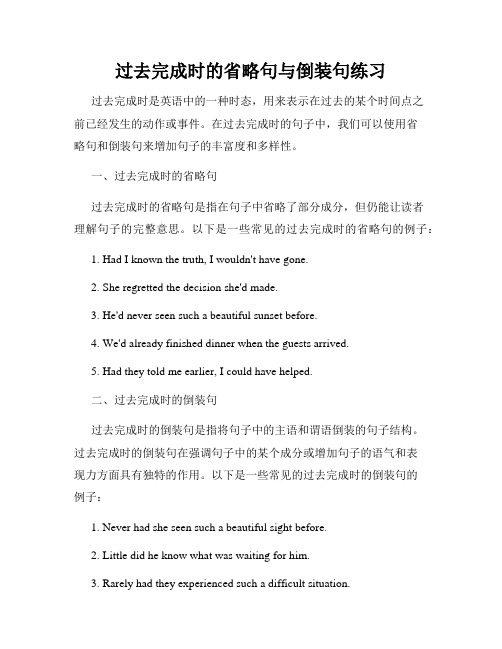
过去完成时的省略句与倒装句练习过去完成时是英语中的一种时态,用来表示在过去的某个时间点之前已经发生的动作或事件。
在过去完成时的句子中,我们可以使用省略句和倒装句来增加句子的丰富度和多样性。
一、过去完成时的省略句过去完成时的省略句是指在句子中省略了部分成分,但仍能让读者理解句子的完整意思。
以下是一些常见的过去完成时的省略句的例子:1. Had I known the truth, I wouldn't have gone.2. She regretted the decision she'd made.3. He'd never seen such a beautiful sunset before.4. We'd already finished dinner when the guests arrived.5. Had they told me earlier, I could have helped.二、过去完成时的倒装句过去完成时的倒装句是指将句子中的主语和谓语倒装的句子结构。
过去完成时的倒装句在强调句子中的某个成分或增加句子的语气和表现力方面具有独特的作用。
以下是一些常见的过去完成时的倒装句的例子:1. Never had she seen such a beautiful sight before.2. Little did he know what was waiting for him.3. Rarely had they experienced such a difficult situation.4. Never before had I felt so happy.5. Scarcely had he arrived when the phone rang.总结:通过练习过去完成时的省略句与倒装句,可以更好地掌握这两种句型的用法,并丰富自己的英语表达方式。
英语中的倒装、强调和省略
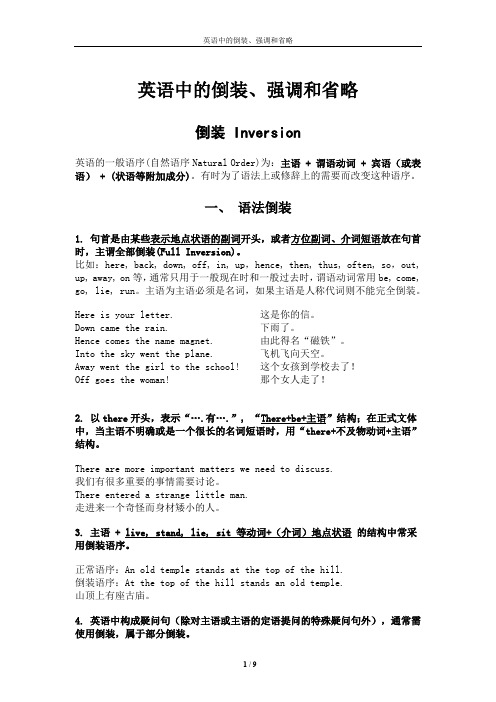
英语中的倒装、强调和省略倒装 Inversion英语的一般语序(自然语序Natural Order)为:主语 + 谓语动词 + 宾语(或表语) + (状语等附加成分)。
有时为了语法上或修辞上的需要而改变这种语序。
一、语法倒装1. 句首是由某些表示地点状语的副词开头,或者方位副词、介词短语放在句首时,主谓全部倒装(Full Inversion)。
比如:here, back, down, off, in, up,hence, then, thus, often, so,out, up, away, on等,通常只用于一般现在时和一般过去时,谓语动词常用be, come, go, lie, run。
主语为主语必须是名词,如果主语是人称代词则不能完全倒装。
Here is your letter. 这是你的信。
Down came the rain. 下雨了。
Hence comes the name magnet. 由此得名“磁铁”。
Into the sky went the plane. 飞机飞向天空。
Away went the girl to the school! 这个女孩到学校去了!Off goes the woman! 那个女人走了!2. 以there开头,表示“….有….”, “There+be+主语”结构;在正式文体中,当主语不明确或是一个很长的名词短语时,用“there+不及物动词+主语”结构。
There are more important matters we need to discuss.我们有很多重要的事情需要讨论。
There entered a strange little man.走进来一个奇怪而身材矮小的人。
3. 主语 + live, stand, lie, sit 等动词+(介词)地点状语的结构中常采用倒装语序。
正常语序:An old temple stands at the top of the hill.倒装语序:At the top of the hill stands an old temple.山顶上有座古庙。
高考英语总复习-倒装句与省略句用法

倒装句与省略句用法第一、倒装句用法英语的基本句型是主语 + 谓语。
如果将主语与谓语调换, 称倒装句。
倒装句分全倒装句和半倒装句。
一、全倒装: 主语与谓语交换位置不需任何助动词, 叫全倒装。
全倒装有以下三种情况:1、当here, there, out, in, up, down等副词放在句首时, 句子需全倒装:There goes the bell! 铃响了!There lived an old man in the village.村里有一位老汉。
Here comes the bus.汽车来了。
注意:①在这种情况下倒装仅限于不及物动词或be动词, 像go, come, rush,march等。
②主语如果是代词时不需倒装如Away he went. 他走远了。
2、方位状语在句首, 如:In front of the house stopped a police car.房前停一辆警车。
Nearby were two canoes in which they had come to the island.附近有两只小船,他们乘着来到这个小岛。
Under the tree sat a boy.树下坐着一个小男孩。
3 、直接引语在句首, 这种情况可倒装也可不倒装“What does it mean?” asked the boy或the boy asked.二、半倒装: 主语与谓语的助动词交换位置称半倒装, 有以下数种情况:1、否定意义的词在句首, 句子半倒装, 例如: little, never, not, no, hardly, rarely, seldom 等。
Never shall I forget you.我绝不会忘记你。
At no time was the man aware of what was happening. 这人绝不知道发生了什么事情。
Little did I understand what he said to me at that time. 当时我不知道他对我说什么。
高三英语倒装与省略试题

高三英语倒装与省略试题1. Hearing the loud explosion, _______ with nothing on him.A.out did he rush B.out he rushedC.out rushed he D.rushed he out【答案】B【解析】考查倒装。
表示运动方向的副词或地点状语置于句首,谓语表示运动的动词且主语是名词时使用倒装,当主语是普通名词时用完全倒装句,但当主语是代词时,就要用部分倒装。
句意:听到巨大的爆炸,他什么也没穿就跑出来了。
故B正确。
【考点】考查倒装2.— Did you know any French before you arrived in Washington?— Never ______ it, actually.A.had I learned B.have I learnedC.I learned D.was I learning【答案】A【解析】试题分析:句意:-在你到达华盛顿之前你懂得一些法语吗?-实际上我一点儿都没有学过。
首先排除C项,根据分析,可知道在到达华盛顿之前没学过法语,用过去完成时态,故A正确考点:考查部分倒装3.(2014年福州市高三适应性练习)32. Look! From opposite the street _________, screaming in panic.A.come two kids B.coming two kidsC.comes two kids D.two kids are coming【答案】A【解析】当表示地点状语的介词短语被提前到句首表示强调的时候,要把谓语动词提前到做主语的名词前,构成全部倒装句。
句义:看,从对面的街上来了两个孩子,害怕地尖叫了起来。
因为句子的主语是two kids,所以谓语动词使用复数形式come。
故A正确。
【试题延伸】1.由地点和时间副词引出的完全倒装句:以地点副词here, there和时间副词now, then 开头,后面的动词是be, come, exist, fall, follow, go, lie, remain, seem, stand等,而主语又是名词时,构成完全倒装句。
高中英语语法特殊句式(倒装、省略、强调)
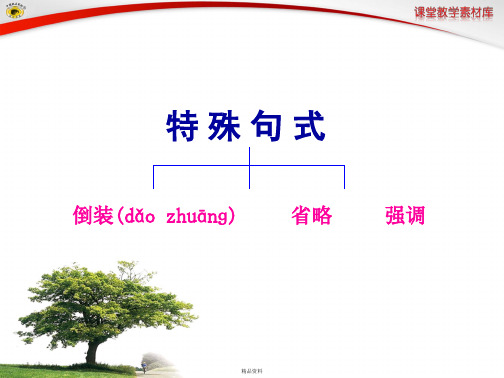
3.在对话或并列句中,如果主语(zhǔyǔ)、谓语不同,而宾语相同, 则常省去相同的宾语部分。 Tom enjoys dancing, but Peter hates (dancing).
精品资料
4.省略作宾语的不定式短语,只保留to,但如果该宾语是动词 be或完成时态,则须在之后加上be或have: —Are you going there? —Yes, I’d like to (go there). 注意(zhù yì):在下列词后常省略不定式但要保留to: want, wish, like, hate, hope, intend, plan, love, refuse, expect,但当 want 和like用于从句中时,to常常省略。
My office was on the tenth floor, and his (office was) on the twelfth (floor). 并列句的省略有时还可出现在前面(qián mian)的分句 中,这时被省略的词语便出现在下文。
精品资料
5.only + 状语(zhuàngyǔ)(副词、介词短语、状语(zhuàngyǔ)从句)放在句首时 。(部分倒装) 1)Only then did I realize the value of reading aloud every morning. 2)Only by means of talking can we avoid misunderstanding each other.
精品资料
2.方位词in, out, there, here, inside, outside, up, down, away, off, downstairs, upstairs等以及now, then置于句首时,谓语动词常用 be, come, go, lie, run等,并且句子的主语(zhǔyǔ)是名词。为以示 强调或为了使情景更生动, 要全部倒装。(全部倒装) 1) Away flew the bird which I bought yesterday. 2) Now comes your turn to sweep the floor. 注意: 主语(zhǔyǔ)是人称代词时,仍用自然语序。 Away they went. (=They went away.)
省略和倒装
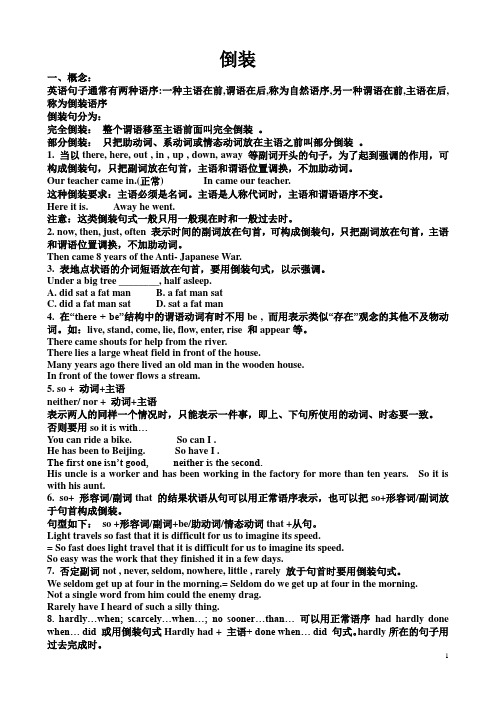
倒装一、概念:英语句子通常有两种语序:一种主语在前,谓语在后,称为自然语序,另一种谓语在前,主语在后,称为倒装语序倒装句分为:完全倒装:整个谓语移至主语前面叫完全倒装。
部分倒装:只把助动词、系动词或情态动词放在主语之前叫部分倒装。
1. 当以there, here, out , in , up , down, away 等副词开头的句子,为了起到强调的作用,可构成倒装句,只把副词放在句首,主语和谓语位置调换,不加助动词。
Our teacher came in.(正常) In came our teacher.这种倒装要求:主语必须是名词。
主语是人称代词时,主语和谓语语序不变。
Here it is. Away he went.注意:这类倒装句式一般只用一般现在时和一般过去时。
2. now, then, just, often 表示时间的副词放在句首,可构成倒装句,只把副词放在句首,主语和谓语位置调换,不加助动词。
Then came 8 years of the Anti- Japanese War.3. 表地点状语的介词短语放在句首,要用倒装句式,以示强调。
Under a big tree ________, half asleep.A. did sat a fat manB. a fat man satC. did a fat man satD. sat a fat man4. 在“there + be”结构中的谓语动词有时不用be , 而用表示类似“存在”观念的其他不及物动词。
如:live, stand, come, lie, flow, enter, rise 和appear等。
There came shouts for help from the river.There lies a large wheat field in front of the house.Many years ago there lived an old man in the wooden house.In front of the tower flows a stream.5. so + 动词+主语neither/ nor + 动词+主语表示两人的同样一个情况时,只能表示一件事,即上、下句所使用的动词、时态要一致。
倒装句与省略句讲解

倒装句与省略句倒装句和省略句是英语中常用的两种特殊句式。
倒装句是指由于修辞的需要,谓语动词发生前移的语句。
省略句,省略句子中的某个或某些成分。
有了倒装句和省略句,英语句子家族更加多姿多彩,语言表达也更加丰富了。
一、倒装句英语句子的语序有时由于修辞的需要,把谓语或部分谓语提到主语之前,这样的句子称为倒装句。
倒装句分为完全倒装(谓语全部置于主语之前)和部分倒装(部分谓语放在主语之前)两种。
1 完全倒装句子的主语较长时(多数情况下又没有宾语),因为要避免头重脚轻的感觉,通常把表语或状语放在句子的前面。
例如:Before the thief stood John who was a detective and had arrested him twice.这个小偷的面前站着曾逮过他两次的探长约翰。
In the small box was the ring that he had given her twenty years before.那个小盒里面是那枚他二十年前送给她的戒指。
So shocked was she at the news that he had died the day before.获悉他昨天去世的消息,令她十分震惊。
2 部分倒装(1)so, neither, nor位于句首,表示与前面谓语所述情况相同。
例如:I am a doctor.我是医生。
So am I.我也是(医生)。
He will go skating.他要去滑冰。
So will she.她也要去(滑冰)。
I didn't finish my homework.我作业没写完。
Neither did I.我也没写完。
I haven't been to the Summer Palace.我没有去过颐和园。
Neither have I.我也没有去过(颐和园)。
The two-year-old child can not eat a meal herself; nor can she dress (herself).这个两岁的孩子还不会自己吃饭,她也不会自己穿衣服。
科技英语的翻译——13 句子成分的强调、倒装、分隔和省略

句子成分的强调、倒装、分隔和省略1.强调通过添加强调词、采用强调句型或改变成分的结构位置等手段来突出某一部分。
(1)添加强调词[例句] Beta is approximately constant for an individual transistor, although it does vary with temperature and slightly with the collector current.(强调动词do)[译文] 对某个晶体管而言, 近似为常数,尽管它确实会随温度及集电极电流的变化而变化。
(2)采用强调句型It is (was) + 被强调的成分+ that (which, who, whom),可强调主语,宾语和状语,不能强调定语和谓语。
[例句] We conclude that it is the ratio of the average signal power to the average noise power that is important, and not the magnitudes of S and N themselves.[译文] 我们得到结论,平均信号功率与平均噪声功率之比是重要的,而信号与噪声本身幅度的大小并不重要。
(强调主语)[例句] Ironically, it was Bell himself who invented one of the earliest light-wave communications devices in 1880.[译文] 讽刺地是,正是比尔本人于1880年发明了最早的光波通信设备之一。
(3)改变句子成分的结构位置[例句] Very obvious is the ever-growing influence on mankind by the adoption of radio- broadcasting both sound and television.(倒装强调)[译文] 非常显著的是,无线电及电视广播的应用,对人类产生的日益增长的影响。
高中英语语法系统讲解之十三省略、倒装和强调
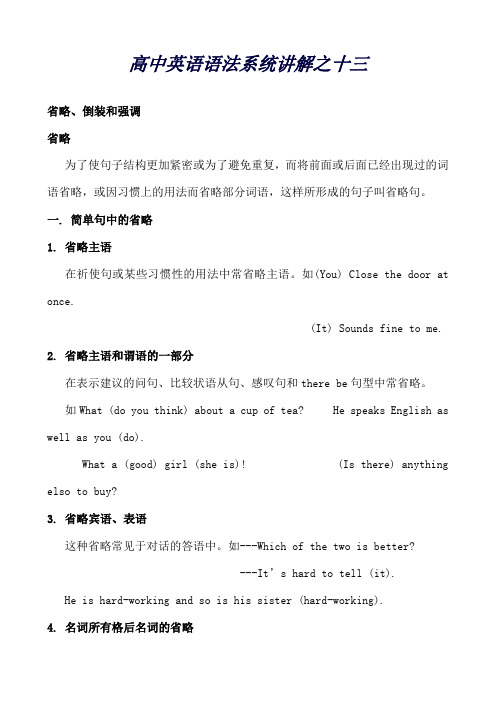
高中英语语法系统讲解之十三省略、倒装和强调省略为了使句子结构更加紧密或为了避免重复,而将前面或后面已经出现过的词语省略,或因习惯上的用法而省略部分词语,这样所形成的句子叫省略句。
一. 简单句中的省略1. 省略主语在祈使句或某些习惯性的用法中常省略主语。
如(You) Close the door at once.(It) Sounds fine to me.2. 省略主语和谓语的一部分在表示建议的问句、比较状语从句、感叹句和there be句型中常省略。
如What (do you think) about a cup of tea? He speaks English as well as you (do).What a (good) girl (she is)! (Is there) anything elso to buy?3. 省略宾语、表语这种省略常见于对话的答语中。
如---Which of the two is better?---It’s hard to tell (it).He is hard-working and so is his sister (hard-working).4. 名词所有格后名词的省略名词所有格修饰的名词有上下文已出现或表示店铺、住宅、教堂等地点时常省略。
如These are John’s books and those are Mary’s (books).At her mother’s (house) she passed many happy days.5. 冠词的省略在某些固定短语the next day(morning,week,year …)中,有时为了使语气紧凑,定冠词the常可以省略;在副词的最高级前面定冠词常可以省略;另外在某些独立结构中和as引导的让步状语从句中,常可省略冠词。
如We went to the farm to help the farmers with the harvest (the) next day.He sings (the) best in the class. Child as she is, she knowsa lot.6. 介词的省略一些动词搭配构成的短语,如prevent / stop sb(from)doing,have trouble / difficulty/ problems(in)doing,spend time(in)doing等中的介词常可以省略。
英语语法倒装结构,省略结构
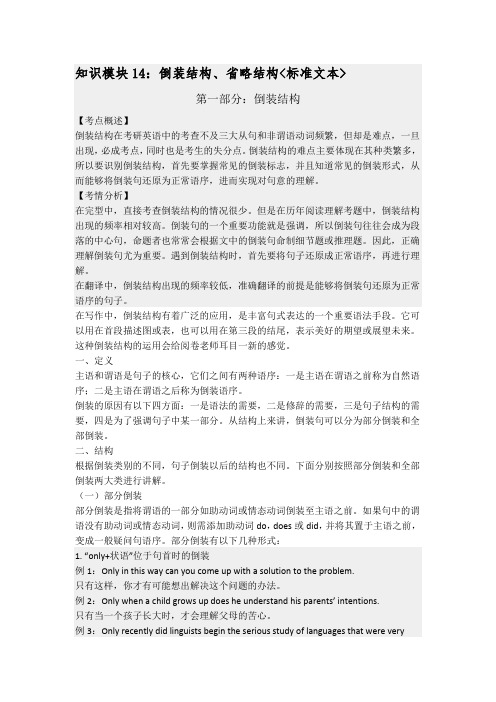
知识模块14:倒装结构、省略结构<标准文本>第一部分:倒装结构【考点概述】倒装结构在考研英语中的考查不及三大从句和非谓语动词频繁,但却是难点,一旦出现,必成考点,同时也是考生的失分点。
倒装结构的难点主要体现在其种类繁多,所以要识别倒装结构,首先要掌握常见的倒装标志,并且知道常见的倒装形式,从而能够将倒装句还原为正常语序,进而实现对句意的理解。
【考情分析】在完型中,直接考查倒装结构的情况很少。
但是在历年阅读理解考题中,倒装结构出现的频率相对较高。
倒装句的一个重要功能就是强调,所以倒装句往往会成为段落的中心句,命题者也常常会根据文中的倒装句命制细节题或推理题。
因此,正确理解倒装句尤为重要。
遇到倒装结构时,首先要将句子还原成正常语序,再进行理解。
在翻译中,倒装结构出现的频率较低,准确翻译的前提是能够将倒装句还原为正常语序的句子。
在写作中,倒装结构有着广泛的应用,是丰富句式表达的一个重要语法手段。
它可以用在首段描述图或表,也可以用在第三段的结尾,表示美好的期望或展望未来。
这种倒装结构的运用会给阅卷老师耳目一新的感觉。
一、定义主语和谓语是句子的核心,它们之间有两种语序:一是主语在谓语之前称为自然语序;二是主语在谓语之后称为倒装语序。
倒装的原因有以下四方面:一是语法的需要,二是修辞的需要,三是句子结构的需要,四是为了强调句子中某一部分。
从结构上来讲,倒装句可以分为部分倒装和全部倒装。
二、结构根据倒装类别的不同,句子倒装以后的结构也不同。
下面分别按照部分倒装和全部倒装两大类进行讲解。
(一)部分倒装部分倒装是指将谓语的一部分如助动词或情态动词倒装至主语之前。
如果句中的谓语没有助动词或情态动词,则需添加助动词do,does或did,并将其置于主语之前,变成一般疑问句语序。
部分倒装有以下几种形式:1. “only+状语”位于句首时的倒装例1:Only in this way can you come up with a solution to the problem.只有这样,你才有可能想出解决这个问题的办法。
- 1、下载文档前请自行甄别文档内容的完整性,平台不提供额外的编辑、内容补充、找答案等附加服务。
- 2、"仅部分预览"的文档,不可在线预览部分如存在完整性等问题,可反馈申请退款(可完整预览的文档不适用该条件!)。
- 3、如文档侵犯您的权益,请联系客服反馈,我们会尽快为您处理(人工客服工作时间:9:00-18:30)。
英语省略与倒装一:倒装语序的重点英语的基本语序“主语+谓语”,这叫陈述句语序。
如果将谓语的全部或一部分放在主语之前,这种语序叫做倒装语序。
当谓语全部放在主语之前时,叫做全部倒装;当谓语的一部分(如助动词或情态动词)放在主语前面时,叫做部分倒装。
以下几点是倒装的重点:(1) 句首为下列副词的句子Here,There,Now,Out,In,Up,Down,Away,Off,Then, 不加助动词直接倒装.例如:Here is a ticket for you.这里有你一张票。
Down came the bird.那只鸟飞了下来。
Up went the plane.那架飞机冲入云霄。
注意:但是如果主语是代词就不倒装。
例如:Here you are. There he comes.(2)在下列副词为首的句型中,形成部分倒装。
Only+副词、介词短语、状语从句或Often\,Many a time。
①Only then did I realize the importance of English.②Only in Beijing have I seen such a beautiful scenery.③Only when the war was over in 1918 was he able to come back to work.④Often did we ask her not to be late for school⑤Many a time has he helped us.他曾多次帮助过我们。
(3)用于前面所说的情况也适用于另一人(或物)的肯定句或否定句中:①肯定重复倒装用:so例如:They have all got up,and so has Jack他们都起来了,所以杰克也起来了。
②否定重复倒装用:nor,neither,no more。
例如:If you don’t agree to our plan,neither will they.如果你们不同意我们的计划,他们也不同意。
Tom can’t speak French.Nor(Neither)can Jack.汤姆不会讲法语,杰克也不会讲。
(4)在下列以否定意义的副词、短语为首的句子或句型中,形成部分倒装:never, seldom ,at no time(决不),(注意:in no time 不倒装) by no means(决不),nowhere ,in no case(决不), little, under(in)no circumstances ,not only ,neither ,nor ,no sooner...than...,never before, not until, hardly(scarcely ,barely)...when...,not only...but also....例如:Never before have I seen such a wonderful park.我从未看见过这样美丽的公园。
No sooner had I gone out than it rained.我刚出去,就下雨了。
(5)用于让步状语从句中(由某些连词连接的):no matter how (who...),however,as。
例如:No matter how busy he is,he has to attend the meeting.无论多忙,他都得去参加会议。
However cold it is,he always goes swimming.无论多冷他总去游泳。
Brave as they are,they are afraid of fight.他们虽然很勇敢,但害怕斗争。
(6)so …that 句型中, so放在句首,要用倒装:So loudly did he speak that even people in the next room could hear him.So shallow was the river that there were no fish in the lake.(7)省略if 的虚拟条件句Had I been informed earlier ,I could have come .Should anyone call ,tell him to wait for me here.(8)as /though引导的让步状语从句中,把表语、宾语、状语提到句首,有的称为倒状,其实主谓并没有倒状Young as he is ,he is very brave.Child as he is ,he knows a lot.Try as he might ,he failed again.Much as I like the book ,I won’t buy it.(8)There be+主语+其它There is a book on the desk(9)分词放句首时起强调作用,句子全部倒装。
Gone are the days when we depended on foreign oil.(10)句子的倒装Not only…but also, Hardly/Scarcely…when, No sooner… than(注意此处的时态问题: Hardly/Scarcely…when, No sooner… than中,Hardly/Scarcely加过去完成时,when后用过去时.No sooner后用过去完成时,than后用过去时)1: Not only did he refuse the gift, he also severely criticized the sender.2: Hardly had she gone out when a student came to visit her.3: No sooner had she gone out than a student came to visit her.4:No sooner___ than it began to rain heavily.A. the game beganB.has the game begunC. did the game beginD.had the game begun(11) 直接引语的全部或一部分放在句首时,主句中的主谓也常直接倒装。
(完全倒装)e.g. "Very well," said the French student."Bring me two eggs and a cup of tea, please." said he.(12) A. 在疑问句中各种疑问句一般地说都是倒装语序。
例如:1 :Will they come to see us this weekend ?2 :Are you talking about the film you saw last Monday ?3 :Can you speak another foreign language except English?4 :Where did you buy the dictionary, in the book store nearby or in Xinhua bookstore?5 :She is not a student, isn't she ? 她不是个学生,对吗?(13).在感叹句中某些感叹句也用倒装语序。
例如:Isn't it a beautiful garden ! 多么美丽的花园啊!What a beautiful garden it is ! 多么美丽的花园啊!(在这种句式中,主语在谓语之前,属于自然语序。
对于主语和谓语而言,语序没有倒装。
)Have you ever seen such a naughty kid like him !你见过那个孩子像他这么调皮!(14) 由于修辞或是平衡句子的原因也可以用倒装句;也可以不用。
这不是一条必须的规定。
A :Next to this one is another grand hotel which is beautifully decorated .这家饭店隔壁还有一家装修华丽的大饭店。
B : On either side of the great avenue stood many block buildings.这条大街的两侧都耸立着许多综合楼。
(这类句子也可以不用倒装句。
)C :"I'm leaving for Beijing tomorrow," said Tom to his mother (OR: Tom said to his mother) .汤姆对他妈妈说:"我明天动身去北京。
"D :Many block buildings stood on either side of the great avenue.许多综合楼耸立在这条大街的两侧。
E :Another grand hotel, which is beautifully decorated, is next to this one .这家饭店隔壁还有一家大饭店,那家饭店装修十分华丽。
F: North of the city lies a big lake.G :Around his neck was a big brown snake.第二部分:省略为了避免重复,使语言简练紧凑,在不损害结构或引起误解的原则下,往往省去一个或多个句子成分或词语。
1.简单句中的省略。
(1)所有格之后的名词如为住宅、商店、工矿、教堂等可以省略。
例如:She is going to her uncle’s (house).她去舅舅家。
Today I met her at the tailor’s (shop).今天我在裁缝店碰见她。
(2)there + be结构中的引导词there以及谓语be,或同时省略,或省略there。
例如:(There are)No gains without pains.不劳无获。
(Is there)Anything wrong?怎么啦?(3)独立主格结构中的分词如为being或having been时,则多省去不用,意义不受影响。
例如:The meeting(being)over,we all left the room.会议结束后我们都离开了房间。
Books (having been)carried,we went to our school.拿着书本我们就去上学了。
